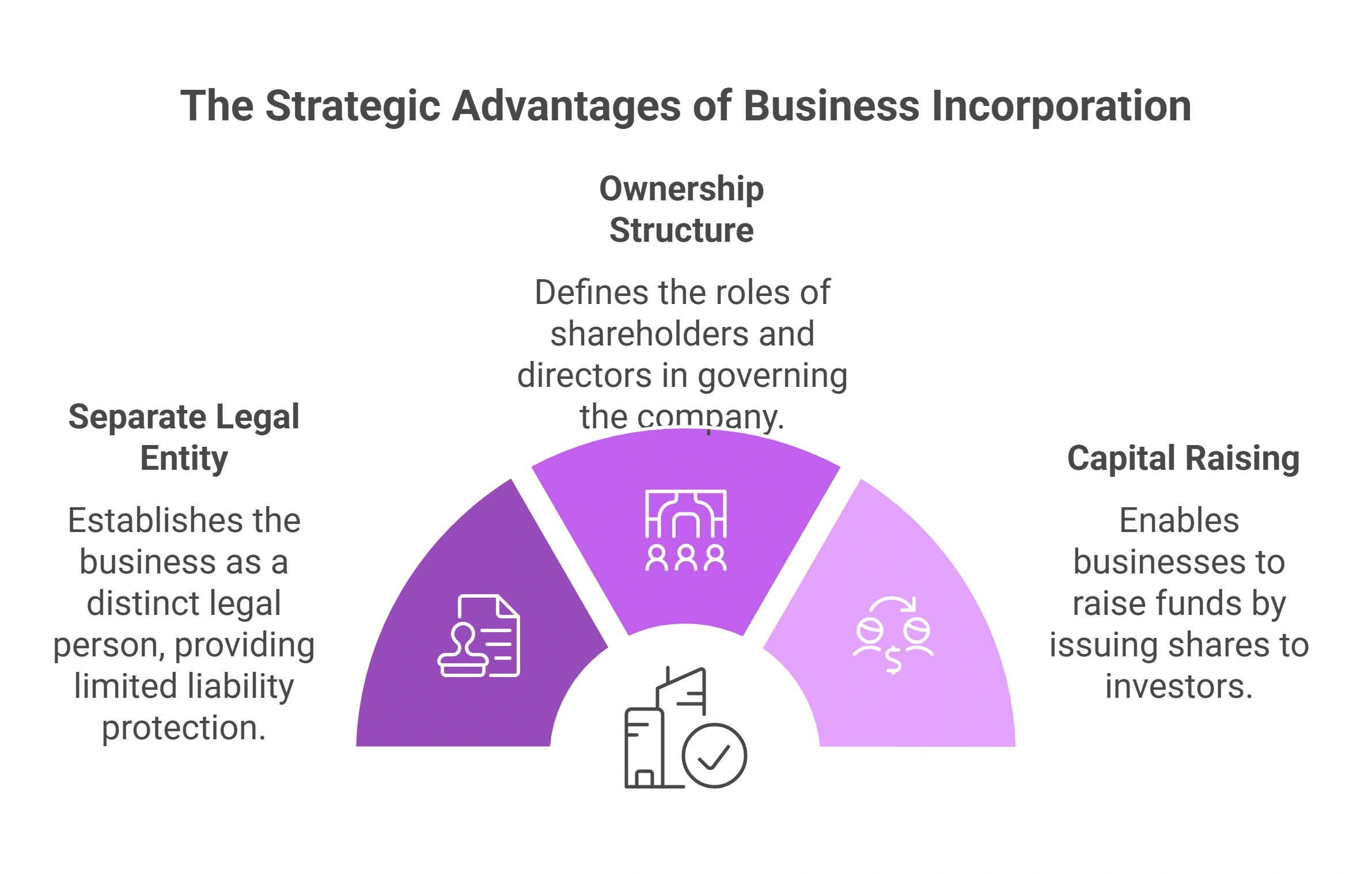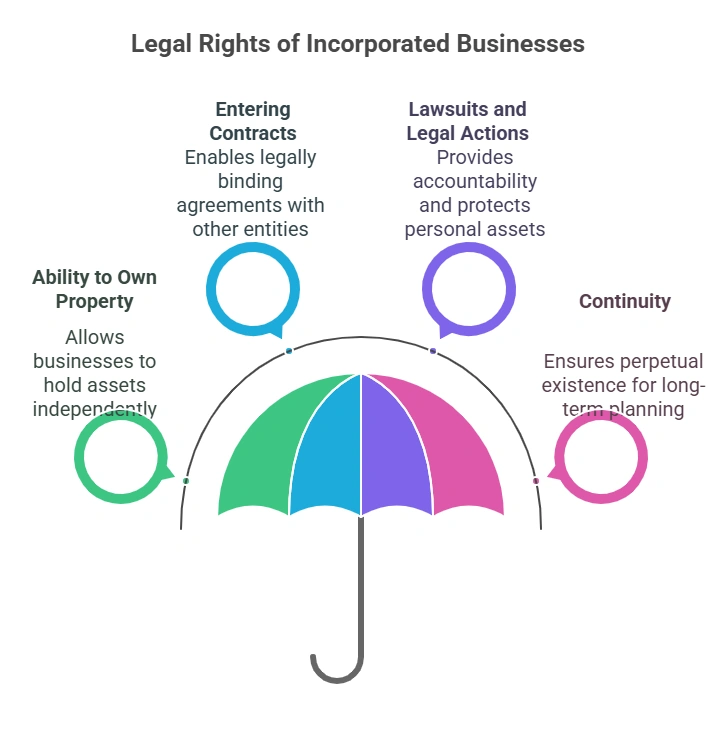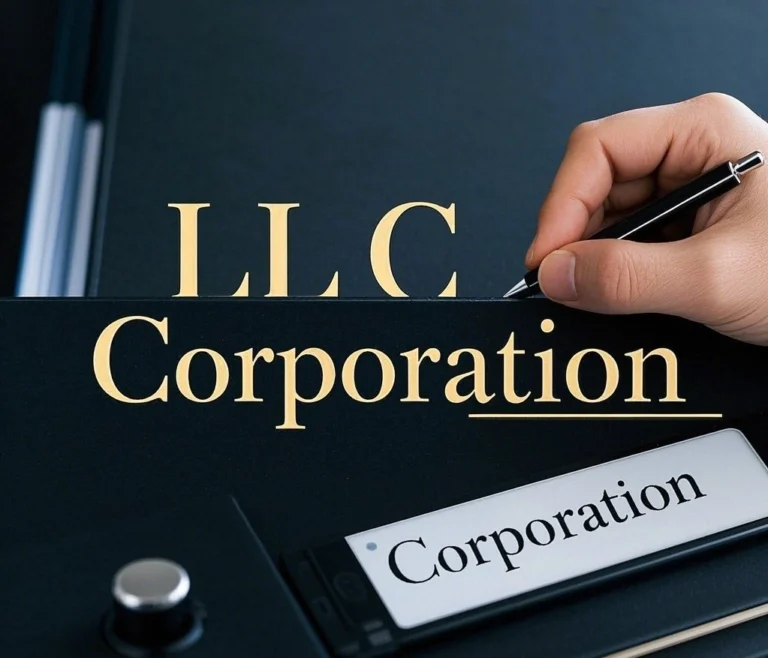Incorporation is the legal process through which a business becomes a distinct legal entity, separate from its owners. By filing specific documents with the state, a business transforms into a corporation or limited liability company (LLC), granting it the ability to function independently in the eyes of the law. This transformation is more than just a paperwork procedure—it brings with it a range of legal, financial, and operational advantages that can significantly impact the growth and security of the business.
For business owners, incorporation provides an essential layer of protection by shielding personal assets from the company’s liabilities. Without incorporation, owners may be personally responsible for business debts and legal obligations. However, once incorporated, the company itself becomes liable for its actions, not the individual stakeholders, ensuring that personal assets such as homes, savings, and investments remain untouched.
Moreover, incorporation is a key step in legitimizing business operations. It instills credibility, making it easier to attract investors, secure loans, and enter into contracts. In essence, incorporation transforms a fledgling enterprise into a legally recognized entity, capable of operating with a higher degree of stability, security, and professionalism.
- The Basics of Incorporation: What Does It Mean?
- Why is Incorporation Important for Your Business?
- The Step-by-Step Process of Incorporation
- Key Aspects of Incorporation
- What Are the Legal Rights and Responsibilities of an Incorporated Business?
- What Are the Tax Advantages of Incorporation?
- Can Anyone Incorporate a Business?
- Resources for Aspiring Incorporators
- FAQ – Incorporation
The Basics of Incorporation: What Does It Mean?
Definition of Incorporation
Incorporation is the legal process by which a business becomes a corporation, effectively transforming it into a separate legal entity distinct from its owners. This process involves registering the business with a state or government agency, typically by filing Articles of Incorporation, which outline the company’s name, purpose, and structure.
Once incorporated, the business gains the ability to act as a “person” in the eyes of the law. This means it can own property, enter contracts, and conduct business activities independently of its founders or shareholders.

Key Characteristics of an Incorporated Business
An incorporated business operates as an independent entity, separate from its owners. This distinction is one of the primary advantages of incorporation, as it offers the business several legal protections. One of the most important is limited liability, which shields the personal assets of the business owners from business debts and liabilities. In other words, if the company faces financial difficulties or legal action, the personal property of its shareholders or directors is generally not at risk.
Additionally, an incorporated business has a formal structure, often consisting of shareholders who own the company and directors who manage its operations. This creates a clear separation between ownership and management, allowing the business to be run by individuals who may not be the original founders but are trusted to handle day-to-day activities.
Legal Rights and Responsibilities
Incorporation grants a business several important legal rights. For example, it can enter into contracts, open bank accounts, and sue or be sued in its own name. These rights allow an incorporated business to function more effectively in the marketplace, building relationships with suppliers, customers, and partners without relying on individual owners for legal recognition.
However, along with these rights come legal responsibilities. Incorporated businesses must comply with various regulations, including filing tax returns, maintaining proper accounting records, and submitting annual reports to government agencies. These obligations ensure that the business operates transparently and remains accountable to the authorities, its shareholders, and other stakeholders. Failure to meet these responsibilities can result in penalties or even the dissolution of the company.
Why is Incorporation Important for Your Business?
Limited Liability Protection
One of the most significant advantages of incorporation is limited liability protection. This legal safeguard ensures that the personal assets of business owners, such as homes, cars, and savings, are generally protected from the company’s debts and liabilities. In other words, if the business faces lawsuits, financial troubles, or bankruptcy, the personal finances of its owners (whether they are shareholders or directors) are shielded. This makes incorporation an essential step for entrepreneurs looking to reduce personal financial risk while operating their business.

Tax Benefits and Financial Advantages
Incorporation can provide notable tax benefits that may not be available to sole proprietors or partnerships. For example, incorporated businesses often enjoy access to a lower corporate tax rate compared to personal income tax rates. Additionally, businesses that are incorporated can deduct certain business expenses (like employee salaries, office supplies, and other operational costs) from their taxable income, leading to potential tax savings.
Beyond taxes, incorporation offers the ability to raise capital more effectively. By issuing shares of stock, incorporated businesses can attract investors, raise funds, and expand their operations. This is especially valuable for startups or growing businesses seeking capital to fund new projects or scale their ventures. Shareholders, in exchange for their investment, receive ownership stakes and can participate in the company’s growth potential.
Credibility and Growth Potential
Incorporation also enhances the credibility of a business. The formal legal status of a corporation conveys a sense of professionalism and stability to customers, partners, and investors. It can help your business stand out in a competitive market and instill confidence in stakeholders who may be more inclined to do business with a legally recognized entity rather than an unincorporated venture.
Moreover, incorporating your business can support growth potential. With access to capital through the issuance of shares and the ability to form strategic partnerships, an incorporated company can scale more easily than an unincorporated one. The company can expand into new markets, hire additional employees, and increase its product or service offerings, all while maintaining a solid legal foundation.
The Step-by-Step Process of Incorporation
Filing Articles of Incorporation
The first major step in the incorporation process is filing the Articles of Incorporation, also known as the Certificate of Incorporation or Charter. These documents must be submitted to the relevant state or government agency (e.g., Secretary of State in the U.S.). The Articles typically include essential details about the business, such as its name, purpose, registered office address, and the number and types of shares the company can issue. Filing the Articles is critical because it legally establishes the business as a separate entity and sets the foundation for its operations.

The Articles of Incorporation serve as a public record, proving that your business exists in the eyes of the law. These documents are not only important for compliance purposes but also for attracting investors, securing loans, and entering into contracts. Therefore, it’s essential to ensure accuracy when completing this filing and comply with local requirements.
Choosing the Right Business Structure
Next, you’ll need to determine the right business structure for your incorporation. The two most common types are Limited Liability Companies (LLC) and Corporations (often referred to as C Corporations or S Corporations in the U.S.). Each structure offers different advantages, so choosing the one that aligns with your business goals is crucial.
- LLC
This structure provides limited liability protection like a corporation, but it’s typically simpler and more flexible, with fewer ongoing formalities. LLCs are often chosen by small business owners who want the liability protection without the complexity of a corporation.
- Corporation
A corporation is a more formal structure with stricter regulations, but it offers greater potential for growth, especially when it comes to raising capital by issuing shares. A corporation is a separate legal entity, offering liability protection, and is better suited for businesses planning to scale and attract investors.
Choosing the right structure affects your taxes, legal obligations, and ownership flexibility, so it’s important to consult with a legal or business advisor to determine the best fit for your specific needs.
Registration and Naming Conventions
Once you’ve decided on the business structure, the next step is registration. This involves submitting your Articles of Incorporation and paying the appropriate fees to the relevant government agency. After registration, your business is officially recognized as a separate legal entity.
During the registration process, businesses must also adhere to naming conventions. Depending on the jurisdiction, incorporated companies often need to include specific terms in their business name, such as “Inc.” (Incorporated) or “Ltd.” (Limited). These suffixes signal that the business is incorporated and provides limited liability protection. While these naming conventions are common, they may not be required in every location, so it’s important to check with the relevant authorities.
Having the correct legal name and proper registration ensures your business operates within the legal framework and protects its brand identity.
Key Aspects of Incorporation
Separate Legal Entity
One of the most important aspects of incorporation is the creation of a separate legal entity. Once a business is incorporated, it becomes a distinct legal person, separate from its owners. This means the business itself can own property, enter contracts, sue, and be sued independently of its owners. The main benefit of this separation is the protection it provides to the business owners’ personal assets. In the case of financial failure or legal action, the owners’ personal property—such as their homes or savings—is generally protected from the liabilities of the business. This limited liability protection is one of the primary reasons businesses choose to incorporate.

Ownership and Management Structure
Incorporated businesses have a clear ownership and management structure that differentiates them from other business types. Shareholders own the company by holding shares of stock, while directors manage the company’s operations and make major business decisions. This dual structure allows for the separation of ownership and control. Shareholders elect the directors, who are responsible for overseeing the company’s strategy and operations, often through regular meetings.
This separation between ownership (shareholders) and management (directors) is in contrast to simpler business structures, like sole proprietorships and partnerships, where the owners directly manage the day-to-day operations. The incorporation structure allows for a more formalized decision-making process and greater accountability, especially in larger businesses.
Capital Raising Opportunities
Incorporation opens the door to significant capital raising opportunities. Incorporated businesses, particularly corporations, have the ability to raise funds by issuing shares of stock to investors. This makes it easier for businesses to attract capital and expand, as investors can buy shares in exchange for ownership stakes. By issuing shares, companies can raise large sums of money without having to take on debt. The ability to issue stock also gives companies a means to reward employees through stock options, creating an additional incentive to attract top talent.
The flexibility to raise capital through shares is one of the main advantages of incorporating, especially for businesses with growth potential. This ability to access capital is essential for scaling, entering new markets, or making large investments—something that unincorporated businesses or sole proprietorships may struggle to achieve.
What Are the Legal Rights and Responsibilities of an Incorporated Business?
Rights of Incorporated Businesses
- Ability to Own Property
As a separate legal entity, an incorporated business can purchase, own, and sell property in its own name. This includes everything from real estate to intellectual property and assets. This right is crucial for businesses looking to establish a long-term presence and hold assets without them being tied to the personal ownership of its founders or shareholders.
- Entering Contracts
An incorporated business can enter into legally binding contracts with other entities, including vendors, customers, and employees. This is important for securing agreements and forming relationships necessary for the business’s operations. The business itself, rather than its owners, is responsible for fulfilling the terms of these contracts.
- Lawsuits and Legal Actions
Incorporated businesses can sue other parties and be sued, making them accountable for their actions. This provides protection for the personal assets of business owners, as legal disputes are handled by the entity itself, not by the individuals running the business.
- Continuity
An incorporated business has perpetual existence, meaning it continues to exist even if the shareholders or directors change. This continuity makes it easier for businesses to plan for the future and establish long-term operations, as they are not dependent on the individuals running them.

Responsibilities of Incorporated Businesses
-
Tax Returns and Payments An incorporated business is required to file annual tax returns and pay corporate taxes. The business itself is taxed on its profits, and shareholders are also taxed on any dividends they receive. It is essential for businesses to keep accurate financial records to ensure they meet tax obligations.
- Regulatory Compliance
Incorporated businesses must comply with various local, state, and federal regulations that govern business operations. This includes adhering to industry-specific standards, labor laws, environmental regulations, and more. Regulatory compliance also involves submitting required documents like annual reports to government agencies to maintain the corporation’s good standing.
- Corporate Governance
Corporations are required to maintain a certain level of corporate governance. This means they must hold annual general meetings (AGMs), keep accurate records of corporate resolutions, and abide by any rules set forth in their articles of incorporation or bylaws.
- Ongoing Filings and Documentation
Incorporation doesn’t end with filing the articles of incorporation. Businesses must continue to file necessary documents, such as annual reports and updated bylaws. They must also notify regulatory bodies of any significant changes, such as a change in directors or business address.
What Are the Tax Advantages of Incorporation?
Lower Tax Rates
One of the primary benefits of incorporating a business is the potential for lower tax rates. Unlike sole proprietors or partnerships, which are taxed based on personal income tax rates, incorporated businesses are generally taxed at a corporate tax rate, which is often lower. This can lead to significant savings, particularly for businesses that generate substantial income. By incorporating, business owners can often reduce their overall tax burden, allowing more resources to be reinvested into the growth of the business.

Tax Deductions and Benefits
- Business Expenses
Incorporated businesses can deduct a variety of operational costs, including rent, utilities, employee salaries, office supplies, and equipment. These deductions lower the overall taxable income of the business, reducing the amount of tax it needs to pay.
- Depreciation
Businesses can also claim depreciation on assets such as machinery, office equipment, and vehicles. Over time, this allows companies to spread the cost of their assets over several years and reduce taxable profits.
- Employee Benefits
Incorporated businesses can offer tax-deductible benefits to employees, including health insurance, retirement contributions, and other fringe benefits. These deductions are not only beneficial for the business but also help in attracting and retaining top talent.
- Dividends and Shareholder Benefits
Shareholders of incorporated businesses may be able to receive dividends from the company, which are often taxed at a lower rate than regular income. This creates a favorable structure for business owners who wish to draw income from their company while minimizing their personal tax liability.
- Retirement Contributions
Incorporated businesses can contribute to retirement plans for both the owners and employees, allowing them to take advantage of tax deferral. Contributions to retirement accounts like 401(k) plans can be deducted from the company’s taxable income, providing both immediate tax savings and long-term retirement benefits.

By leveraging these tax advantages, incorporated businesses can reduce their tax burden, manage their cash flow more effectively, and reinvest savings into the growth and expansion of the company.
Can Anyone Incorporate a Business?
Eligibility for Incorporation
Incorporating a business is a legal process that requires meeting certain eligibility criteria, which vary depending on the country and the type of business structure. However, some common requirements include:
- Business Location
A business must be registered within a specific jurisdiction. In most cases, this means choosing a country or region where the business will operate and be governed by local laws. Some countries have more favorable tax structures or legal systems for incorporation, which is why businesses often choose to incorporate in certain jurisdictions.
- Shareholders
To incorporate a business, there must typically be at least one shareholder who owns shares in the company. In some jurisdictions, only one shareholder is required, while in others, there may be a minimum number of shareholders (e.g., two or more). Shareholders can be individuals or legal entities, and their role is to invest in the business and own portions of its equity.
- Directors
Most incorporated businesses need at least one director, who is responsible for overseeing the company’s operations. In many cases, the director must be an individual and can also serve as a shareholder. Directors manage the day-to-day activities of the business and are accountable for its legal compliance.
- Registered Office
An incorporated business usually needs a physical address (a registered office) within the country of incorporation. This is where official documents and communications will be sent.
- Company Name
A unique name must be chosen for the business, which adheres to the naming regulations of the jurisdiction. The name must not conflict with other existing businesses, and certain suffixes (like “Inc.” or “Ltd.”) may be required to indicate its incorporated status.

Process Overview for Different Countries:
- United States
In the U.S., incorporation begins by choosing a state in which to incorporate. Each state has its own rules, with Delaware being a popular choice due to its favorable corporate laws. The business must file Articles of Incorporation with the state’s Secretary of State and pay the required fees. The process is relatively straightforward, and the business will then need to obtain an Employer Identification Number (EIN) from the IRS, register for taxes, and follow local regulations.
- United Kingdom
In the UK, the incorporation process is handled by Companies House, the government agency responsible for registering companies. The business must submit a memorandum of association and articles of association, along with a registration fee. The business must have at least one director and a company secretary in certain circumstances. After registration, the company will be given a Company Registration Number (CRN).
- Canada
In Canada, businesses can incorporate at either the federal or provincial level. Federal incorporation allows the business to operate across the entire country, while provincial incorporation restricts the business to a specific province. The business must file Articles of Incorporation with Corporations Canada (for federal incorporation) or the respective provincial authority. Similar to other countries, a business must choose a unique name and have a registered office.
- Australia
In Australia, incorporation is managed by Australian Securities and Investments Commission (ASIC). Businesses must lodge an Application for Registration and provide a company name, registered office, details of directors, and shareholders. After registration, the business receives an Australian Company Number (ACN) and must comply with the ongoing filing requirements.
Although the specifics of incorporation can vary by jurisdiction, the general steps involve filing incorporation documents, appointing directors, having a registered office, and meeting local legal and tax requirements.
Resources for Aspiring Incorporators
- Stripe’s Guide to Incorporation
Stripe offers an extensive guide on incorporation, covering everything from the basics to more advanced topics. This guide explains the benefits of incorporation and offers practical tips for entrepreneurs looking to incorporate their businesses.
- Wolters Kluwer’s Insights
Wolters Kluwer provides valuable resources on business incorporation, discussing the various benefits and how it can help businesses grow. For a comprehensive look at the process and advantages.
- GoCardless’s Guide
GoCardless offers a practical guide focused on the incorporation process in the UK, helping business owners understand the steps involved, the legal requirements, and the benefits of incorporation in the UK.
FAQ – Incorporation
What do you mean by incorporating?
Incorporating refers to the legal process of transforming a business into a separate legal entity, distinct from its owners. This is done by registering the business with a government authority, such as filing Articles of Incorporation. Once incorporated, the company gains legal rights, such as entering contracts, owning property, and protecting its owners from personal liability for business debts.
What is an example of incorporation?
An example of incorporation is when a small business owner registers their company as a corporation or Limited Liability Company (LLC). For instance, if a freelance graphic designer decides to incorporate as “Creative Designs Inc.,” the business becomes a separate legal entity, allowing it to enter contracts, hire employees, and protect the owner’s personal assets from business-related liabilities.
What is the meaning of incorporation of terms?
Incorporation of terms refers to the inclusion of specific legal provisions or clauses in a contract or agreement. These terms define the rights, responsibilities, and obligations of the parties involved. For example, when signing a software license agreement, the incorporation of terms ensures that the user agrees to specific conditions set by the provider.
What is a synonym for the word incorporation?
Synonyms for incorporation include “formation,” “establishment,” “registration,” “constitution,” and “legalization.” These words describe the process of creating a formal business entity that is recognized by law.
What is the meaning of incorporation contract?
An incorporation contract is an agreement that outlines the foundational aspects of a newly formed corporation. It typically includes details such as the company’s name, purpose, structure, share distribution, and governance rules. This contract ensures that the corporation operates according to legal and regulatory requirements, protecting the interests of its owners and stakeholders.



















0 Comments